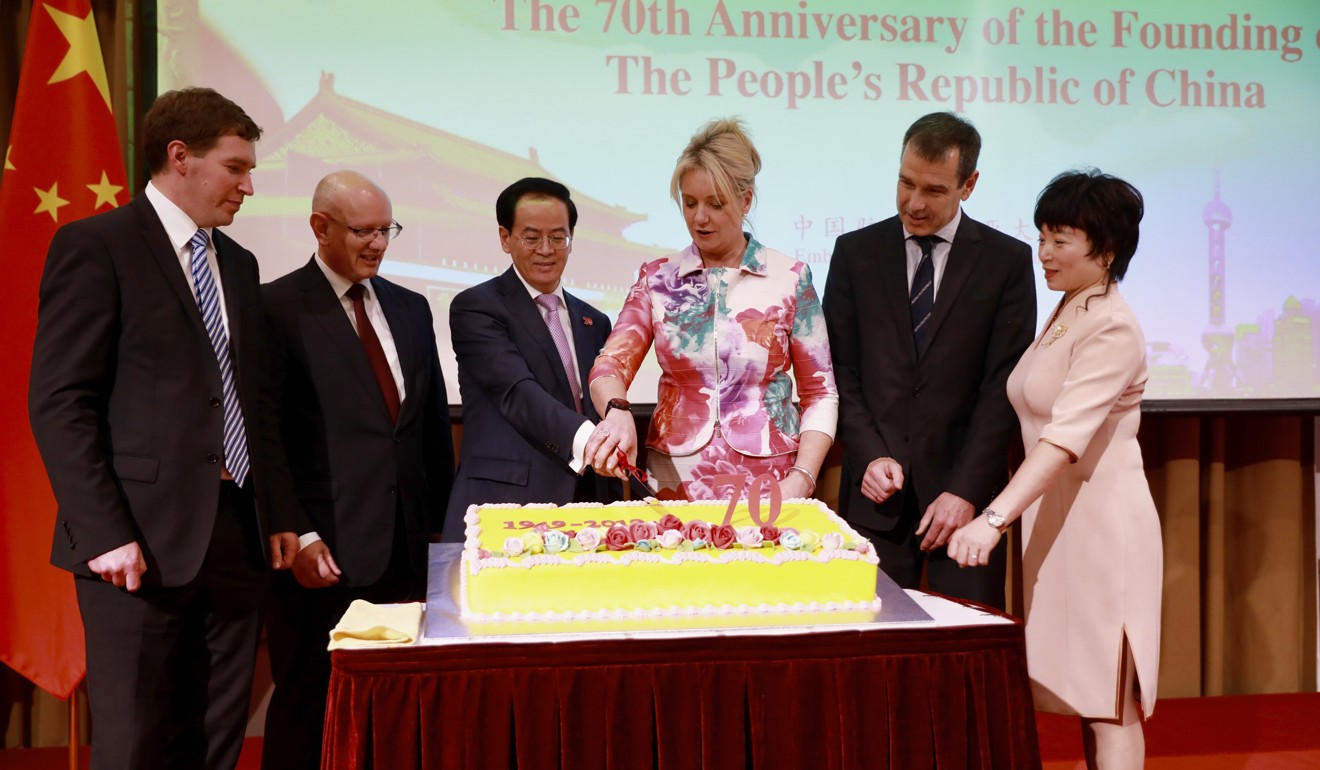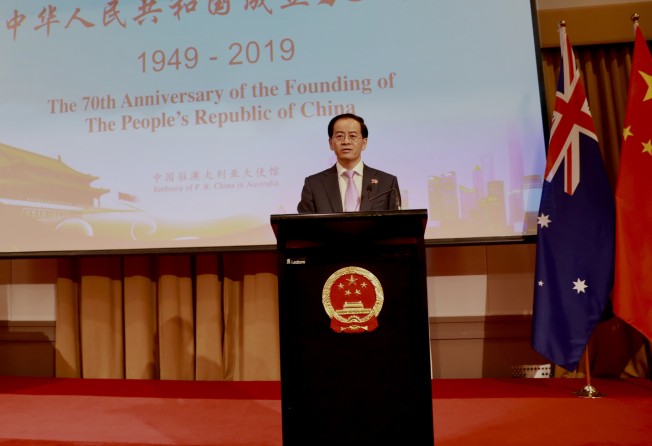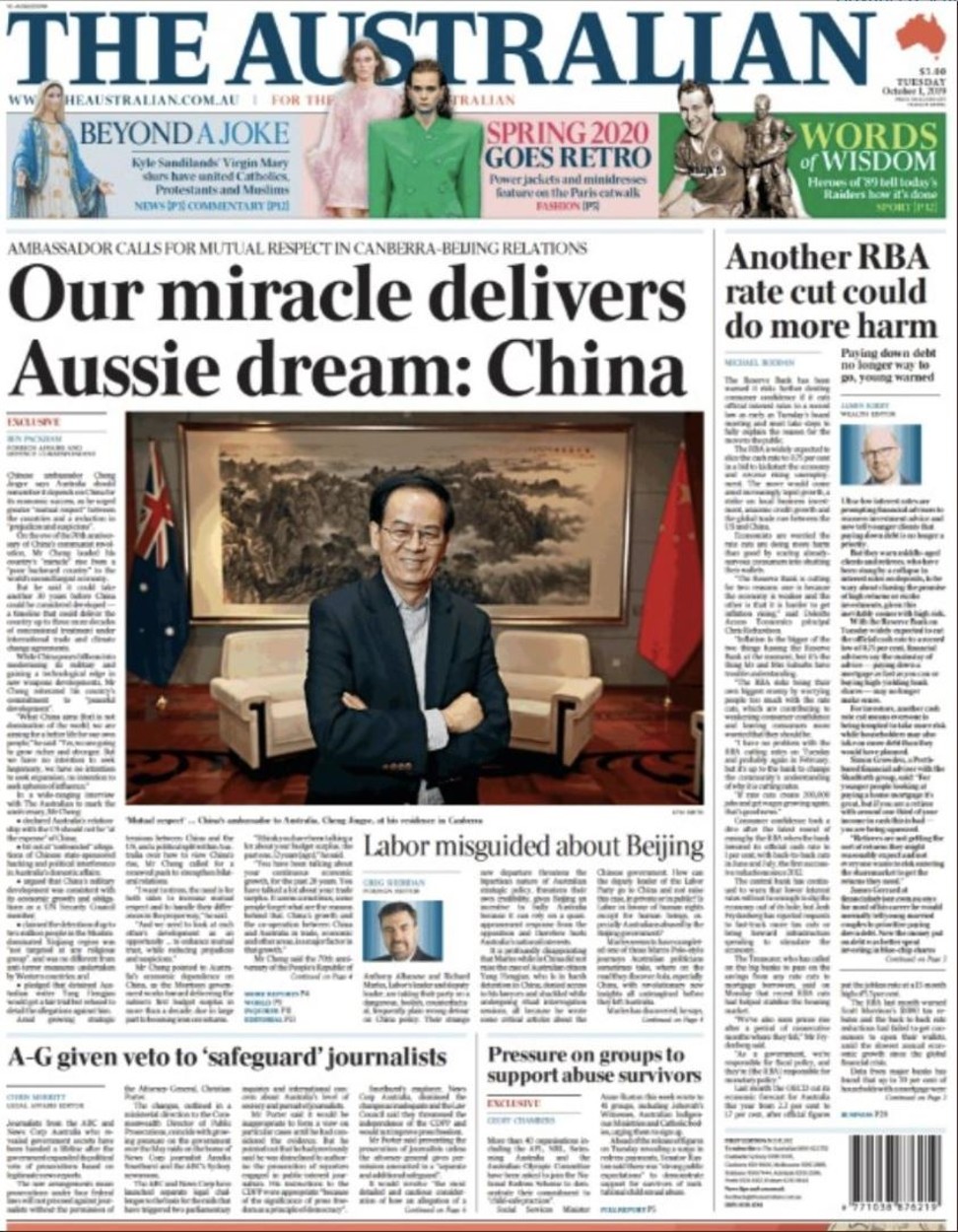
Chinese envoy stresses Beijing’s role in Australia’s prosperity amid interference fears
- Ambassador Cheng Jingye, in a front-page interview published in The Australian, said Canberra and Beijing should ‘handle differences in the proper way’
- But the article, which also included Cheng’s comments on Uygurs in Xinjiang, drew criticism from several journalists with an analyst saying it was unlikely to be viewed positively by Australians

China’s ambassador to Australia has sought to alleviate concerns about allegations of Beijing’s political interference by emphasising the importance of economic and trade ties in underwriting Australia’s long-term prosperity.
In an interview published on the front page of The Australian newspaper on Tuesday, the 70th anniversary of China’s founding, Cheng Jingye said Australia’s 28-year run of uninterrupted economic growth and expectations of a budget surplus this year proved Beijing and Canberra should “look at each other’s development as an opportunity”.
“China’s growth and the cooperation between China and Australia in trade, economic and other areas is a major factor in that growth,” Cheng told the newspaper. “I want to stress, the need is for both sides to increase mutual respect and to handle their differences in the proper way.”

China buys almost one-third of Australia’s exports but allegations of Beijing’s political meddling have strained bilateral relations. Canberra last year introduced anti-foreign interference laws and banned Chinese tech giant Huawei from its 5G network, citing national security concerns.
Cheng acknowledged China had grown from a “poor and backward nation” to the world’s second-largest economy but rejected Australian Prime Minister Scott Morrison’s recent characterisation of his country as a “newly developed economy” that should face tougher rules at the World Trade Organisation. China’s self-identification as a “developing country” allows it greater access to subsidies and more time to meet obligations to ease trade barriers.
“We say in China we have centenary goals,” Cheng said. “The first one is of course that we aim to complete the building of what we say is a moderately well-off society. The first centenary goal we aim to achieve by next year.
“The second centenary goal is to build on those achievements and start a new journey where we aim to become a fully modernised socialist country by the middle of this century, that is in about 30 years. We still have a long way to go to become a developed country.”
Cheng also insisted Chinese-Australian writer Yang Hengjun, who has been denied access to a lawyer since being detained in China in January on suspicion of espionage, would receive a fair trial in accordance with the country’s “strong rule of law”.
Australian Foreign Minister Marise Payne has expressed “serious concerns” about Yang’s detention, urging Beijing to adhere to international human rights laws which guard “against arbitrary detention” and “protect the right to freedom of thought, conscience and religion”.
Cheng also dismissed reports by Western governments and human rights groups that Muslim minorities in China’s Xinjiang region, including more than 1 million members of the Uygur community, had been detained without trial in re-education camps.
China’s growth and the cooperation ... is a major factor in that growth
“What has been done there, as I see it, is no different to what has been done by the Western countries, including this country,” Cheng said.
Coverage of China in the Australian media has doubled since this time last year, according to data released last week by media monitoring company Streem, driven by increased interest in Hong Kong, human rights in China and the US-China trade war.
The interview, published under the headline “Our miracle delivers Aussie dream: China”, provoked criticism from a number of journalists on social media who took issue with Cheng’s comments on the treatment of Uygurs.

Kate Shuttleworth, who writes for The Guardian, labelled the article “irresponsible journalism”.
Sophie McNeill, a reporter with the ABC’s investigative programme Four Corners, branded the interview “shameful” and likened it to coverage in the state-run China Daily newspaper.
“The ambassador is not challenged over this in the article,” McNeil said. “There is not a line saying ‘all evidence proves this claim to be untrue’. Journalism is about calling out lies and exposing the truth. This is embarrassing.”
Nathan Attrill, a PhD candidate studying Chinese politics at Australian National University’s Crawford School in Canberra, said the Chinese ambassador’s comments were unlikely to be viewed positively by most Australians.
“If the ambassador’s comments were intended to persuade, Australians may not take too kindly to being told who pays their bill in such a blatant manner,” Attrill said. “His comments have the patronising tone of potential economic blackmail if Canberra simply disagrees with Beijing.
“The economic relationship between Australia and China has benefited both parties: China needs Australia too. But Australia alone is not responsible for the present ‘chill’ and the ambassador may wish to reflect on how the actions of his government have led to this point.”